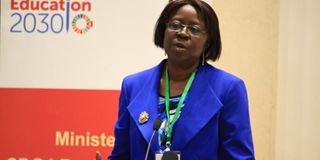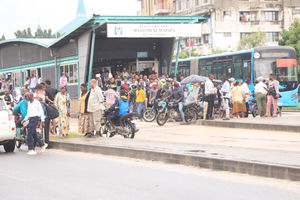Unesco-Samsung hand over Arusha digital village to Tanzania

Unesco officer in charge, Ms Ann Therese Ndong-Jatta,
What you need to know:
The call was made by the Unesco officer in charge, Ms Ann Therese Ndong-Jatta, in a speech delivered during the launch of the Unesco-Sumsung digital village project at the weekend in Ngorongoro District.
Arusha. The United Nations Educational, Scientific and Cultural Organisation (Unesco) has called for continued partnerships, collaboration and commitment for successful governance and management of the telemedicine programme in the country.
The call was made by the Unesco officer in charge, Ms Ann Therese Ndong-Jatta, in a speech delivered during the launch of the Unesco-Sumsung digital village project at the weekend in Ngorongoro District.
In her speech read by Dr Abdul Rahman Lamin, the Unesco regional office for Eastern Africa programme specialist, the Unesco urges continued collaboration with the Ngorongoro District Council and the Ololosokwan Village Council for effective management of the programme.
“The local government should continue sensitising the need to make better utilisation of available technologies and ensure that they are sustainable,” he said.
He added: “Through the digital project, Unesco is proud to see that Ngorongoro is among the pioneers of utilisation of Information and Communications Technologies (ICTs) in education and healthcare services in Tanzania.”
Telemedicine refers to the use of telecommunication and information technology to provide clinical healthcare from a distance Unesco advocates for telemedicineDigital health technology is safe and cost effective as it can be used to overcome distance barriers and improve access to medical services to distant rural communities such as the Ngorongoro community.
The e-health component of the digital village comprises a Tele-medical Centre with facilities capable of providing the Ololosokwan community with convenient access to quality medical services.
“In the long run, lessons learned in telemedicine will be used by the government during the current formulation of the national guidelines on telemedicine,” he said. He said the digital village project was in line with the ongoing process of social and economic transformations aimed at making Tanzania a middle-income economy by 2025.
About the Digital Village
SAMSUNG Electronics launched its first Digital Village in Tanzania in 2014, which is among the first countries in Africa, the others including Ghana, Nigeria, Tanzania, South Africa and Sudan that also benefitted from the initiative. The Digital Village comprises a number of key components that work together to benefit a community in terms of health, education and employment.
The Solar-Powered Internet School is built in a 12-metre repurposed container that can accommodate up to 24 learners and is fitted with solar panels that power the equipment, which include an interactive whiteboard and SAMSUNG Galaxy note PCs. UNESCO will support the provision of Internet connection to the Internet School for the next six months following this official handover. This will give the Local Government ample time to establish a mechanism for sustainable Internet connectivity, which is fundamental to the operations of the Digital Village.
The Digital Village project was designed not only to improve educational, and medical services, but also to promote small businesses through the deployment of solar powered generators and lighting systems in the community. Through this, electric power is therefore also supplied to the Community Art Space (CAS) for the stimulation of small business development. The Community Art Space is a centre for the Maasai culture and crafts, created to promote local culture and crafts visibility to tourism, with the support of a UNESCO-European Union project.




